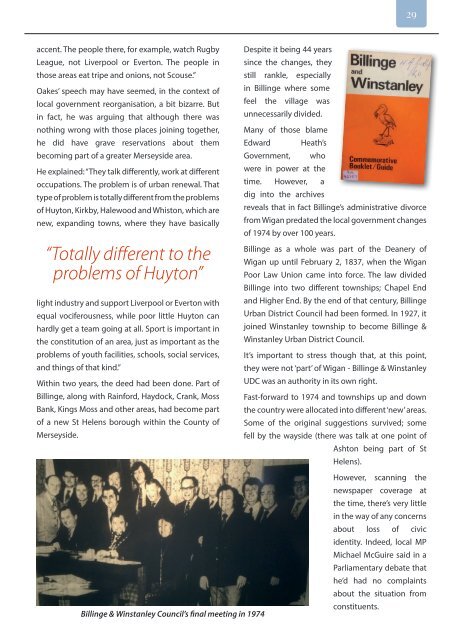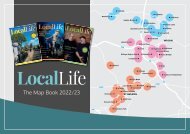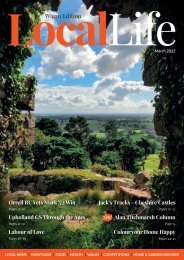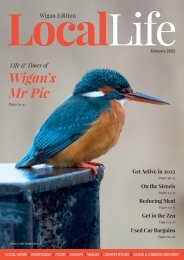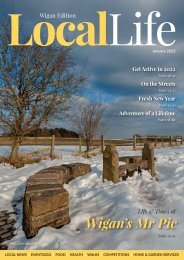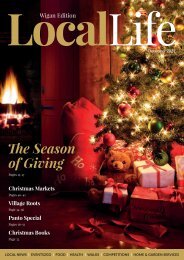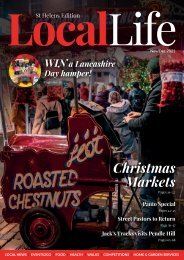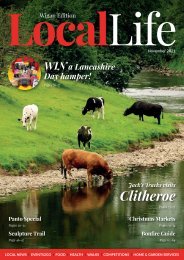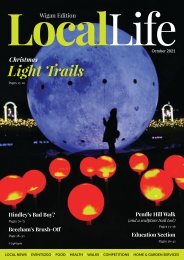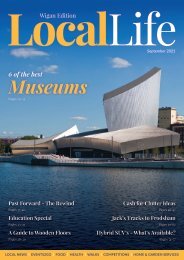Local Life - Wigan - May 2018
Wigan's FREE local lifestyle magazine.
Wigan's FREE local lifestyle magazine.
You also want an ePaper? Increase the reach of your titles
YUMPU automatically turns print PDFs into web optimized ePapers that Google loves.
29<br />
accent. The people there, for example, watch Rugby<br />
League, not Liverpool or Everton. The people in<br />
those areas eat tripe and onions, not Scouse.”<br />
Oakes’ speech may have seemed, in the context of<br />
local government reorganisation, a bit bizarre. But<br />
in fact, he was arguing that although there was<br />
nothing wrong with those places joining together,<br />
he did have grave reservations about them<br />
becoming part of a greater Merseyside area.<br />
He explained: “They talk differently, work at different<br />
occupations. The problem is of urban renewal. That<br />
type of problem is totally different from the problems<br />
of Huyton, Kirkby, Halewood and Whiston, which are<br />
new, expanding towns, where they have basically<br />
“Totally different to the<br />
problems of Huyton”<br />
light industry and support Liverpool or Everton with<br />
equal vociferousness, while poor little Huyton can<br />
hardly get a team going at all. Sport is important in<br />
the constitution of an area, just as important as the<br />
problems of youth facilities, schools, social services,<br />
and things of that kind.”<br />
Within two years, the deed had been done. Part of<br />
Billinge, along with Rainford, Haydock, Crank, Moss<br />
Bank, Kings Moss and other areas, had become part<br />
of a new St Helens borough within the County of<br />
Merseyside.<br />
Despite it being 44 years<br />
since the changes, they<br />
still rankle, especially<br />
in Billinge where some<br />
feel the village was<br />
unnecessarily divided.<br />
Many of those blame<br />
Edward Heath’s<br />
Government, who<br />
were in power at the<br />
time. However, a<br />
dig into the archives<br />
reveals that in fact Billinge’s administrative divorce<br />
from <strong>Wigan</strong> predated the local government changes<br />
of 1974 by over 100 years.<br />
Billinge as a whole was part of the Deanery of<br />
<strong>Wigan</strong> up until February 2, 1837, when the <strong>Wigan</strong><br />
Poor Law Union came into force. The law divided<br />
Billinge into two different townships; Chapel End<br />
and Higher End. By the end of that century, Billinge<br />
Urban District Council had been formed. In 1927, it<br />
joined Winstanley township to become Billinge &<br />
Winstanley Urban District Council.<br />
It’s important to stress though that, at this point,<br />
they were not ‘part’ of <strong>Wigan</strong> - Billinge & Winstanley<br />
UDC was an authority in its own right.<br />
Fast-forward to 1974 and townships up and down<br />
the country were allocated into different ‘new’ areas.<br />
Some of the original suggestions survived; some<br />
fell by the wayside (there was talk at one point of<br />
Ashton being part of St<br />
Helens).<br />
Billinge & Winstanley Council’s final meeting in 1974<br />
However, scanning the<br />
newspaper coverage at<br />
the time, there’s very little<br />
in the way of any concerns<br />
about loss of civic<br />
identity. Indeed, local MP<br />
Michael McGuire said in a<br />
Parliamentary debate that<br />
he’d had no complaints<br />
about the situation from<br />
constituents.


